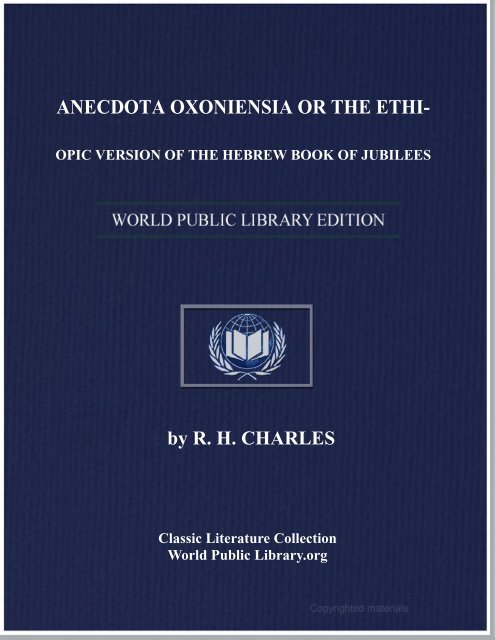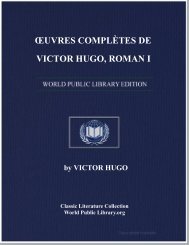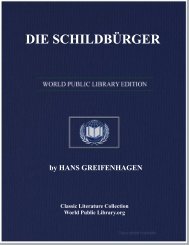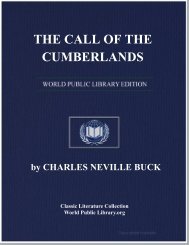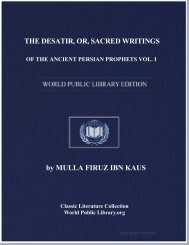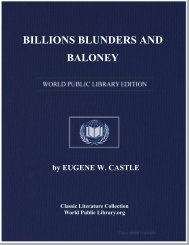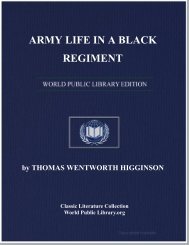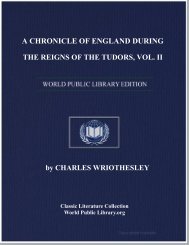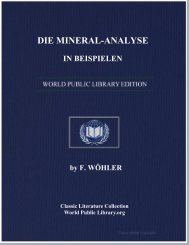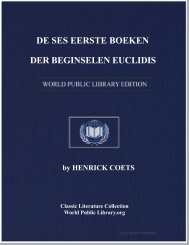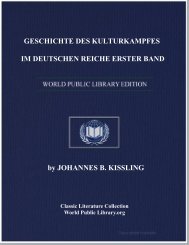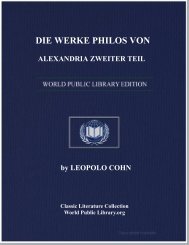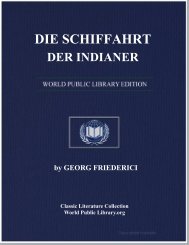anecdota oxoniensia or the ethiopic version of the hebrew book of ...
anecdota oxoniensia or the ethiopic version of the hebrew book of ...
anecdota oxoniensia or the ethiopic version of the hebrew book of ...
You also want an ePaper? Increase the reach of your titles
YUMPU automatically turns print PDFs into web optimized ePapers that Google loves.
ANECDOTA OXONIENSIA OR THE ETHI-<br />
OPIC VERSION OF THE HEBREW BOOK OF JUBILEES<br />
by R. H. CHARLES<br />
Classic Literature Collection<br />
W<strong>or</strong>ld Public Library.<strong>or</strong>g
Title: ANECDOTA OXONIENSIA OR THE ETHIOPIC VERSION OF THE HEBREW BOOK OF JUBILEES<br />
Auth<strong>or</strong>: R. H. CHARLES<br />
Language: English<br />
Subject: Fiction, Literature<br />
Publisher: W<strong>or</strong>ld Public Library Association<br />
Copyright © 20, All Rights Reserved W<strong>or</strong>ldwide by W<strong>or</strong>ld Public Library, www.W<strong>or</strong>ldLibrary.net
W<strong>or</strong>ld Public Library<br />
The W<strong>or</strong>ld Public Library, www.W<strong>or</strong>ldLibrary.net is an eff<strong>or</strong>t to preserve and<br />
disseminate classic w<strong>or</strong>ks <strong>of</strong> literature, serials, bibliographies, dictionaries,<br />
encyclopedias, and o<strong>the</strong>r reference w<strong>or</strong>ks in a number <strong>of</strong> languages and countries<br />
around <strong>the</strong> w<strong>or</strong>ld. Our mission is to serve <strong>the</strong> public, aid students and educat<strong>or</strong>s by<br />
providing public access to <strong>the</strong> w<strong>or</strong>ld's most complete collection <strong>of</strong> electronic <strong>book</strong>s on-line<br />
as well as <strong>of</strong>fer a variety <strong>of</strong> services and resources that supp<strong>or</strong>t and streng<strong>the</strong>n <strong>the</strong><br />
instructional programs <strong>of</strong> education, elementary through post baccalaureate studies.<br />
This file was produced as part <strong>of</strong> <strong>the</strong> "eBook Campaign" to promote literacy,<br />
accessibility, and enhanced reading. Auth<strong>or</strong>s, publishers, librari and technologists<br />
unite to expand reading with eBooks.<br />
Supp<strong>or</strong>t online literacy by becoming a member <strong>of</strong> <strong>the</strong> W<strong>or</strong>ld Public Library,<br />
http://www.W<strong>or</strong>ldLibrary.net/Join.htm.<br />
Copyright © 20, All Rights Reserved W<strong>or</strong>ldwide by W<strong>or</strong>ld Public Library, www.W<strong>or</strong>ldLibrary.net
www.w<strong>or</strong>ldlibrary.net<br />
*This eBook has certain copyright implications you should read.*<br />
This <strong>book</strong> is copyrighted by <strong>the</strong> W<strong>or</strong>ld Public Library. With permission copies<br />
may be distributed so long as such copies (1) are f<strong>or</strong> your <strong>or</strong> o<strong>the</strong>rs personal use only,<br />
and (2) are not distributed <strong>or</strong> used commercially. Prohibited distribution includes any<br />
service that <strong>of</strong>fers this file f<strong>or</strong> download <strong>or</strong> commercial distribution in any f<strong>or</strong>m, (See<br />
complete disclaimer http://W<strong>or</strong>ldLibrary.net/Copyrights.html).<br />
W<strong>or</strong>ld Public Library Association<br />
P.O. Box 22687<br />
Honolulu, Hawaii 96823<br />
info@W<strong>or</strong>ldLibrary.net<br />
Copyright © 20, All Rights Reserved W<strong>or</strong>ldwide by W<strong>or</strong>ld Public Library, www.W<strong>or</strong>ldLibrary.net
I<br />
\<br />
•<br />
TO<br />
S R. IV R, D.<br />
D S. A OL U A.<br />
AN<br />
AD NE BA ER M.
xii THE BOOK OF JUBILEES.<br />
"Xvii. 5; xix. 3; xxiv. 20; xxxii. 32; xlvi. 14: with <strong>the</strong> Vulgate in xviii. 15;<br />
xxiv. 20; xxix. 13; xlii. II j xlvi. 13; xlvii. 7 (twice), 8; xlix. 9 (twice) :<br />
with some text which is also <strong>the</strong> source <strong>of</strong> <strong>the</strong> Ethiopic Version <strong>of</strong> Genesis<br />
in <strong>the</strong> two following passages, xix. 14 (cf. Eth. Verso Gen. xxv. 27); xxxix.<br />
13 (cf. Eth. Verso Gen. xxxix. 23). Besides labouring under numerous<br />
c<strong>or</strong>ruptions, this Version is <strong>of</strong>ten defective, and its frequent omissions<br />
through homeoteleuton are quite in keeping with <strong>the</strong> carelessness <strong>of</strong> its<br />
transcribers. It must be conceded in Dr. Ransch's favour, that his<br />
criticism <strong>of</strong> <strong>the</strong> respective merits <strong>of</strong> <strong>the</strong> Ethiopic and Latin Versions is<br />
not so reprehensible when we reflect that f<strong>or</strong> three-fourths <strong>of</strong> <strong>the</strong> fonner<br />
Version he had no better auth<strong>or</strong>ity than a German translation <strong>of</strong> one<br />
c<strong>or</strong>rupt MS. Despite its many defects, however, <strong>the</strong> Latin Version is <strong>of</strong><br />
incalculable w<strong>or</strong>th in <strong>the</strong> criticism and rest<strong>or</strong>ation <strong>of</strong> <strong>the</strong> Ethiopic Version,<br />
f<strong>or</strong> its c<strong>or</strong>ruptions seldom coincide with those <strong>of</strong> that Version. F<strong>or</strong> its<br />
value in this respect we must refer to Section IV. iv. on <strong>the</strong> Materials<br />
f<strong>or</strong> Criticism.<br />
We have given a critically revised text <strong>of</strong> <strong>the</strong>se fragments on <strong>the</strong> pages<br />
facing <strong>the</strong>ir Ethiopic parallels.<br />
III. THE ETHIOPIC MSS.<br />
These manuscripts are four in number, designated in <strong>the</strong> following<br />
pages as ABC D, and belong respectively to <strong>the</strong> National Library<br />
in Paris, <strong>the</strong> British Museum, <strong>the</strong> University Library at Tiibingen, and to<br />
M. d' Abbadie.<br />
A. The <strong>of</strong>ficial description <strong>of</strong> this beautiful MS. in <strong>the</strong> Catalogue<br />
<strong>of</strong> <strong>the</strong> Biblio<strong>the</strong>que Nationale is as follows: 'Velin. 1I0 feuillets. 285<br />
millimetres sur 210. Ecriture sur deux colonnes, du xv- siecte. 23 a 25<br />
lignes par page.' Some <strong>of</strong> <strong>the</strong> folios have got transposed: Ie folio 19 doit<br />
etre place a la suite du folio 25; Ie folio 33 a la place du folio 40; et<br />
Ie folio 40 a la place du folio 33. Its <strong>of</strong>ficial number in <strong>the</strong> Catalogue is<br />
.Eth·51•<br />
This MS. preserves an ancient type <strong>of</strong> <strong>the</strong> text, which in a c<strong>or</strong>rected<br />
and m<strong>or</strong>e c<strong>or</strong>rupt f<strong>or</strong>m appears in D. It constantly combines with B<br />
against <strong>the</strong> later readings, interpolations, and omissions in C D. U nf<strong>or</strong>tunately,<br />
however, its scribe toiled hard to bring it into harmony with <strong>the</strong><br />
Ethiopic Version <strong>of</strong> Genesis. Thus in <strong>the</strong> following passages <strong>the</strong> readings<br />
<strong>of</strong> <strong>the</strong> Eth. Verso <strong>of</strong> Genesis have replaced <strong>the</strong> <strong>or</strong>iginal text against BCD:<br />
Digitized by Google
INTRODUCTION.<br />
and not <strong>the</strong> LXX bef<strong>or</strong>e him. In <strong>the</strong> next place he rightly remarks<br />
that many <strong>of</strong> <strong>the</strong> passages, where Jubilees diverges from <strong>the</strong> Mass<strong>or</strong>etic<br />
text and agrees with <strong>the</strong> LXX, may no doubt be consciously due to <strong>the</strong><br />
Greek translat<strong>or</strong>, who could not help at times rendering <strong>the</strong> text in <strong>the</strong><br />
familiar language <strong>of</strong> <strong>the</strong> LXX; that o<strong>the</strong>rs may be ascribed to <strong>the</strong> influence<br />
<strong>of</strong> <strong>the</strong> LXX, though in following it <strong>the</strong> translat<strong>or</strong> did so unconsciously j<br />
. and that o<strong>the</strong>rs again may be attributed to <strong>the</strong> traditional exegesis <strong>of</strong> <strong>the</strong><br />
time from <strong>the</strong> trammels <strong>of</strong> which <strong>the</strong> auth<strong>or</strong> could not easily disengage<br />
himself. But Dillmann had a grossly exaggerated view <strong>of</strong> <strong>the</strong> number<br />
<strong>of</strong> readings peculiar to <strong>the</strong> LXX and Jubilees; f<strong>or</strong> many <strong>of</strong> <strong>the</strong>se had<br />
been introduced into <strong>the</strong> Ethiopic texts <strong>of</strong> Jubilees from <strong>the</strong> Ethiopic<br />
Version, and many that he thought peculiar to <strong>the</strong> LXX and Jubilees<br />
are supp<strong>or</strong>ted by o<strong>the</strong>r auth<strong>or</strong>ities, and o<strong>the</strong>rs again are due to <strong>the</strong><br />
c<strong>or</strong>ruptness <strong>of</strong> his MSS. C and D.<br />
Dillmann next deals with those cases where Jubilees presupposes a text<br />
diverging from <strong>the</strong> Mass<strong>or</strong>etic. In this connection he collates <strong>the</strong><br />
Samaritan text and frequently <strong>the</strong> LXX, and makes some emendations<br />
in which I am glad to find a confirmation <strong>of</strong> my own judgment. But<br />
after all he merely touches on <strong>the</strong> fringe <strong>of</strong> <strong>the</strong> subject. Of multitudes<br />
<strong>of</strong> instances where our text shows special affinities with <strong>the</strong> various texts<br />
and Versions <strong>of</strong> <strong>the</strong> Pentateuch, <strong>or</strong> conversely where it exhibits strong<br />
lines <strong>of</strong> divergence from <strong>the</strong>m, no account at aU is taken, and even in <strong>the</strong><br />
cases considered <strong>the</strong> critical treatment is inadequate. Thus he never cites<br />
f<strong>or</strong> critical purposes <strong>the</strong> Syriac Version with which <strong>the</strong> Jubilees' text stands<br />
frequently in <strong>the</strong> closest relation, hardly ever <strong>the</strong> Vulgate, and never <strong>the</strong><br />
Targum <strong>of</strong> Onkelos, though lOme <strong>of</strong> <strong>the</strong> apparent idiosyncrasies <strong>or</strong> our<br />
text are unintelligible apart from <strong>the</strong>m.<br />
To sum up. In this Article Dillmann's treatment <strong>of</strong> <strong>the</strong> independent<br />
value <strong>of</strong> <strong>the</strong> Ethiopic text is good as rar as it gael, but very inadequate,<br />
while as regards <strong>the</strong> text itself no real advance is made by means <strong>of</strong> B<br />
towards recovering a purer tradition. Thus <strong>the</strong> text is left pretty much<br />
as it stands in his edition <strong>of</strong> 1859. Such a neglect <strong>of</strong> evidence mUlt<br />
naturally have its nemesis, and so we find Dillmann tracing textual<br />
affinities and divergencies in relation to <strong>the</strong> texts and Versions <strong>of</strong> <strong>the</strong><br />
Pentateuch where none such exist, save in <strong>the</strong> c<strong>or</strong>rupt MSS. on which<br />
his text is based. In <strong>the</strong> rest <strong>of</strong> <strong>the</strong> Article he discusses in a masterly way<br />
<strong>the</strong> chronological questions arising out <strong>of</strong> <strong>the</strong> Book <strong>of</strong> Jubilees. With<br />
<strong>the</strong>se I hope to deal in my Commentary later.<br />
e 2<br />
Digitized by Google<br />
xix
INTRODUCTION.<br />
xxiii<br />
VII I. THE VALUE OF THE BOOK OF JUBILEES IN THE CRITICISM OF<br />
THE MASSORETIC TEXT OF THE PENTATEUCH.<br />
From a study <strong>of</strong> <strong>the</strong> preceding Section it will be clear that both<br />
bef<strong>or</strong>e and after <strong>the</strong> Christian era <strong>the</strong> Hebrew text did not possess any<br />
hard and fast tradition. It will fur<strong>the</strong>r be obvious that <strong>the</strong> Mass<strong>or</strong>etic<br />
f<strong>or</strong>m <strong>of</strong> this text, which has so long been generally assumed as conservative<br />
<strong>of</strong> <strong>the</strong> most ancient tradition and as <strong>the</strong>ref<strong>or</strong>e final, is after all only one <strong>of</strong><br />
<strong>the</strong> many phases through which <strong>the</strong> text passed in <strong>the</strong> process <strong>of</strong> over<br />
1,000 years, i. e. 400 B. C. till 600 A. D. <strong>or</strong> <strong>the</strong>reabouts.<br />
As we pursue <strong>the</strong> examination <strong>of</strong> <strong>the</strong> materials just mentioned we shall<br />
see grounds f<strong>or</strong> regarding <strong>the</strong> Mass<strong>or</strong>etic text as <strong>the</strong> result partly <strong>of</strong><br />
conscious recension and partly <strong>of</strong> unconscious change extending over<br />
many centuries. How this process affected <strong>the</strong> text in <strong>the</strong> centuries<br />
immediately preceding and subsequent to <strong>the</strong>· Christian era, we have<br />
some means <strong>of</strong> determining in <strong>the</strong> Hebrew-Samaritan text which, however<br />
much it may have been tampered with on religious <strong>or</strong> . polemical<br />
grounds, still preserves in many cases <strong>the</strong> older reading even as it preserves<br />
<strong>the</strong> older f<strong>or</strong>m <strong>of</strong> alphabet. Next we have <strong>the</strong> LXX Pentateuch, to which<br />
we may assign <strong>the</strong> date 200 B.C.; next <strong>the</strong> Book <strong>of</strong> Jubilees just bef<strong>or</strong>e<br />
<strong>the</strong> Christian era; <strong>the</strong> Syriac Pentateuch bef<strong>or</strong>e 100 A. D. (so Rendel Hams<br />
on good grounds); <strong>the</strong> Vulgate <strong>of</strong> <strong>the</strong> fourth century; <strong>the</strong> Targums <strong>of</strong><br />
Onkelos and Ps.-Jon. in <strong>the</strong>ir present f<strong>or</strong>m 300-600 A. D.<br />
We have above remarked that <strong>the</strong> evidence <strong>of</strong> Section VII shows that<br />
<strong>the</strong> Mass<strong>or</strong>etic text is only one <strong>of</strong> <strong>the</strong> phases through which <strong>the</strong> Hebrew<br />
text has passed; and if we consider afresh <strong>the</strong> materials <strong>of</strong> evidence in that<br />
Section in connection with <strong>the</strong>ir dates, we shall discover that in some<br />
respects it is one <strong>of</strong> <strong>the</strong> latest phases <strong>of</strong> <strong>the</strong> Hebrew Pentateuch that has<br />
been stereotyped by Jewish scholars in <strong>the</strong> Mass<strong>or</strong>etic text. This conclusion<br />
will tally perfectly with <strong>the</strong> tradition that all existing Mass<strong>or</strong>etic<br />
MSS. are derived in <strong>the</strong> main from one archetype, i.e. <strong>the</strong> Hebrew Codex<br />
left behind him by Ben Asher, who lived in <strong>the</strong> tenth century, and whose<br />
famBy had lived at Tiberias in <strong>the</strong> eighth.<br />
Bef<strong>or</strong>e passing to our main object in this Section we might point out<br />
that some <strong>of</strong> <strong>the</strong> readings enumerated in ii (i') in <strong>the</strong> last Section can<br />
hardly go back to an earlier date than <strong>the</strong> fourth century A. D. ,<br />
We shall now proceed to give a list <strong>of</strong> readings in <strong>the</strong> Mass<strong>or</strong>etic text<br />
Digitized by Google
XVJ. 18-27. 59<br />
gentibus non eonputabitur, quoniam in s<strong>or</strong>te exeelsi erit; quoniam in 18<br />
possessionem 1 Dei eecidit omne semen ejus, esse Deo in populum<br />
sanctifieatum I ex omnibus gentibus [ejus] et ut sit regnum saeerdotale<br />
et populus sanetusl Et abivimus 3 viam nostram et indicavimus Sarrae 19<br />
quaecumque indieavimus ei, et gavisi sunt utrique gaudio magno. Et 30<br />
aedifieavit illie altarium Domino, qui liberavit eum, et *gratiae ejus' in<br />
terram eomm<strong>or</strong>ationis suae; et fecit diem festum laetitiae in mense hoc<br />
septem dies secus altarium (quod aedificaverat secus puteum jurationis).<br />
Et aedificavit tabemaeula sibi et servis suis in die festo hoc: et hic Z I<br />
primus fecit diem Cestum tabemacul<strong>or</strong>um super terram. Et in (his) l:l<br />
diebus (septem) erat <strong>of</strong>ferens per singulos dies super altare fructum<br />
Domino vitulos duos et arietes duos, (et) oves septem; (et) hircum eaprarum<br />
unum pro peccatis, propitiari in ipso pro se et pro semine suo.<br />
Et in sacrificium salutare arietes septem, hedos septem, oves septem lj<br />
et hireos septem, et sacrificia ips<strong>or</strong>um et vinum ips<strong>or</strong>um, et universam<br />
adipem e<strong>or</strong>um erat incendens super altari (e1ectam Domino)5 ostiam in<br />
od<strong>or</strong>em suavitatis. Et mane et vespera' erat ineendens *incensum eom- 2-1<br />
positionis', libanum et galbanum et staeten et nardum et myrram et<br />
spicam et costum, septem has species mundas erat incendens concisas<br />
et aequaliter mixtas. Et fecit diem festum hune per septem dies,:l5<br />
aepulans in toto c<strong>or</strong>de suo et in omni anima sua, ipse et universi domestici<br />
sui, et omnis alienus non erat cum ipsis et omnis (qui non) circumcisus.<br />
Et benedixit creat<strong>or</strong>em suum, qui creavit illum (in familia ipsius J 26<br />
quia in beneplacito suo creavit eum): quia cognovit et scivit quia ex<br />
ipso erit plantatio veritatis in generationibus aeternis et ex ipso semen<br />
sanctum, ut sit secundum hunc 8 qui creavit universa. Et benedixit 27<br />
et gavisus et vocavit nomen [diei] festi hujus dies festos 9 Dominpo,<br />
I MS. possesionem. I Due to confusion <strong>of</strong> oilvlaf and &crCOf; should be<br />
peculiarem j see note .. on Eth. text. • MS. abibimus. • C<strong>or</strong>rupt; Elh. =<br />
gaudio afticiebat eum. I The lacuna in <strong>the</strong> MS. which I have filled up from <strong>the</strong> Eth.<br />
amounts to thirteen <strong>or</strong> fourteen letters. • MS. vesperam. 7 Eth.=od<strong>or</strong>amenta.<br />
• MS. hoc. • MS. festus. 10 Em. with Eth. from dies.<br />
II Wt4I: A. II 'HCI": C D. II A omits.<br />
LaL omits. • c\ B. 37 J'.b.J.: A.<br />
• LaL tJul-a c<strong>or</strong>ruption (1) <strong>of</strong> Domini <strong>or</strong> Dei.<br />
I 2<br />
It Lat. cum ;plil.<br />
• mill": A.<br />
• R"rJWD /ocID": A;<br />
" mAlO: MelD: A.<br />
Digitized by Google
XX. ro-XXI. 7. 73<br />
vestra, quaecunque operatis 1 super terram, et benedicat panem tuum et<br />
aquam tuam et benedicatl fructum uteri tui et fructum terrae tuae eta<br />
armenta bovum tu<strong>or</strong>um. et greges' ovium tuarum. Et eritis in benedic- 10<br />
tione super terra, et desiderabunt vos omnes gentes terrae et benedicent<br />
in Domine meo filios vestros, ut sint in benedictionem, quemadmodum<br />
(et) ego. Et dedit Ismael (et) filiis ejus et filiis Cetturae munera et II<br />
emisit eos ab Isac filio suo (et dedit omnia Isac filio suo. Et abiit u<br />
Ismael)5 et filii ejus et filii Cetturae et filii sui et inhabitaverunt a FaramOD<br />
usque ad introitum Babyloniae in omni terra <strong>or</strong>ientali super fadem<br />
deserti. Et conmixti sunt isti illis, et adhesit nomen ips<strong>or</strong>um Arabiis,13<br />
et Ismaelitaee (usque in diem hanc).<br />
Et in anno sexto *septimanae septimae' jubelei hujus *vocavit XXI.<br />
Abraham 8 lac filium suum et demandavit illi dicens: 'Ego senui et nescio<br />
diem m<strong>or</strong>tis meae et repletus sum diebus meis. Et ecce ego filius' quinque a<br />
et septuaginta et centum ann<strong>or</strong>um sum, in (omnibus) diebus vitae meae<br />
Deum 10 in mem<strong>or</strong>ia habens (semper) et exquirens [eum] in omni virtute<br />
mea ut facerem (omnem) volumtatem ejus et ut dirigerem 11 (gressus) in<br />
omnibus viis ejus. (Et ideo) simulacra odivit anima mea, (et servientes eis .I<br />
eram spemens, et dedi c<strong>or</strong> meum et spiritum) ut custodiam et faciam volumtatero<br />
ejus qui me creavit. Quia Deus vivens est et sanctus et fidelis <strong>of</strong>.<br />
et justus ex omnibus; et 11 non est apud eum accipere personam, ut accipiat<br />
munera, quoniam Deus justus est et judicium ex( ereens in) omnibus qui<br />
transgrediuntur sermones ejus et qui contemnunt testimonium ejus. Et 5<br />
tu fili' custodi praecepta ejus et mandata ejus et judicia ejus, et noli<br />
abire post abominationes (et post sculptiles) et post fusiles. Et nolite 6<br />
manducare omnem sanguinem * omnis camis sive de his quae in terris<br />
sunt, sive quae volant 18 in aere. Et si occiclas ostiam fructuum pacis '1<br />
(acceptabilem), *occidetis eam 14, sanguinem autem ejus effundetis super<br />
I MS. operati. I MS. benedicet. • MS. ut. • MS. egregea. I Lacuna<br />
fi1Ied up from Eth. • MS. lsmaelite. 7 MS. aeptimanarum septimi. ' MS.<br />
vocabit babraham. • MS. filii. ., MS. adds nostrum. 11 See note 16 on<br />
Eth. text. JJ MS. trans. this' et' bef<strong>or</strong>e ex. II Eth.= bestiae et pecudis et<br />
omnia avis quae vow; see note 25 on ver. 6 <strong>of</strong> Eth. text. J. MS. occiditis eum.<br />
.. A omits. • A trans.; Lat. omnli carnU 1m, tit Ini fUIle in itrrU nmll ' Lev.<br />
vii. 26 supp<strong>or</strong>ts text ra<strong>the</strong>r than Lat.; B omits H bef<strong>or</strong>e A1l1ta: • III B.<br />
'11 a.c.e: ABC D.<br />
L [II.S.] G I<br />
Digitized by oog e
XXII. 10-19. 79<br />
saecula.' Et vocavit [Abraham filium suum et] Jacob et dixit: C Nate 10<br />
Jacob, benedicat te Deus omnium et conf<strong>or</strong>tabit te, facere veritatem et<br />
voluntatem suam in conspectu ejuB, et eligere in te et in semine tuo, esse<br />
illi populuml [et] in volumtatem ejus in omnibus diebus. Et tu, nate<br />
Jacob, adproxima te ad me et osculare me.' Et adproximans Jacob Il<br />
osculatus est eum, et dixit: C Benedictus filius meus Jacob et omnes filii<br />
ejus Deo excelso in omnibus (saeculis). Deus det tibi semen veritatis<br />
et de filiis tuis sanctificet I in medio totius terrae: servient tibi gentes,<br />
et ad<strong>or</strong>abunt in conspectu seminis 3 tui omnes populi. Efficere f<strong>or</strong>tis in 12<br />
conspectu hominum et potestatem exerce in omne semen Set '. Tunc<br />
justificabuntur viae tuae et viae fili<strong>or</strong>um tu<strong>or</strong>um, ut sint in populum<br />
sanctum. Det tibi Deus excelsus omnes benedictiones, quas benedixit 13<br />
me et benedixit Noe et Adam, (ut)' requiescant in verticem sanctificationis<br />
seminis tui in omni generatione et generatione usque in saeculum.<br />
Et mundabit te ab omni inquinamento et injustitia, ut propitius sit 14omnibus<br />
injustitiis tuis et neglegentiae tuae, et conf<strong>or</strong>tabit te et benedicet<br />
te, et hereditabis omnem terram. Et renovabit S testamentum ejus 15<br />
cum ipso, ut sis illi in plebem hereditatis (suae) in omnia saecuta, et<br />
ipse erit tibi et semini tuo in Deum in veri tate et justitia omnibus diebus<br />
terrae. Et tu, nate Jacob, memento sermonum me<strong>or</strong>um et custodi prae- 16<br />
cepta patris tui Abraham: separare a gelltibus et noli manducare cum<br />
ipsis nec facias' secundum operas e<strong>or</strong>em et non sis illis in sodalem:<br />
quoniam opera ips<strong>or</strong>um pollutio, et omnis via ips<strong>or</strong>um immunditia et<br />
abominatio et spurcitia. Sacrificant enim (sacrificia sua)' m<strong>or</strong>tuis et 17<br />
daemonia ad<strong>or</strong>ant et super tumulos manducant, et universa opera ips<strong>or</strong>um<br />
vana et nullius momenti. Et non est illis c<strong>or</strong> ut recogitent, et oculi 18<br />
e<strong>or</strong>um non videntes qualia sunt opera ips<strong>or</strong>um et quomodo ipsi errent<br />
dicentes ligno: «Tu es Deus meus," et lapidi: cc Tu es Dominus meus et<br />
tu liberat<strong>or</strong> (meus)," et non est (illis) c<strong>or</strong>. Et tu, nate Jacob, Deus 19<br />
excelsus adjuvabit8 te et Deus Adae 9 conf<strong>or</strong>tabit 10 te et separabit te ab<br />
(omnibus) abominationibus ips<strong>or</strong>um et ab om •.• '<br />
• Eth. adds hereditalis ejus. I Em. with Eth. from sanctificabis. • Em. with<br />
Elh. from nominis. • 1\15. et. • 1\15. renovavis. • 1\15. facies. 7 Lacuna fiUed<br />
up from Eth. eMS. adjubabit. t C<strong>or</strong>rupt; Eth.=cacli. lG Eth.=benedicat.<br />
Digitized by Google
The End.<br />
W<strong>or</strong>ld Public Library Association


